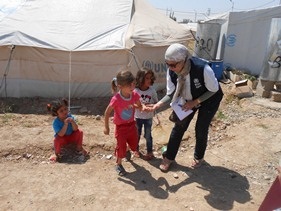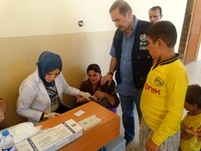 13 August, 2014 – The World Health Organization is supporting the delivery of urgently needed health services to people affected by insecurity in northern Iraq, including tens of thousands of children, women and men trapped on Sinjar Mountain and many more who have escaped to safer areas.
13 August, 2014 – The World Health Organization is supporting the delivery of urgently needed health services to people affected by insecurity in northern Iraq, including tens of thousands of children, women and men trapped on Sinjar Mountain and many more who have escaped to safer areas.
“The health situation on Sinjar Mountain is precarious for approximately tens of thousands of people believed trapped there, while more than 60 000 who have crossed the FeshKhabour border-point through Syria to enter back into Iraq at Dohuk,” said Dr Jaffar Hussain, WHO’s Representative to Iraq.
Dr Hussain said: “Access to health care must be ensured for all people, especially during humanitarian emergencies. People suffering from noncommunicable diseases, like diabetes and cancer, need urgent health services. Mothers still need to deliver babies. The threat of disease outbreaks, included in crowded shelters in Dohuk where many people have fled to, is very present.”
The humanitarian situation of the civilian population on Sinjar Mountain is alarming due to the narrow corridors for transporting essentials such as medicines, food and water, especially with the soaring temperatures which are reaching up to 111 degrees Fahrenheit (44 degrees Celsius).
WHO is coordinating the humanitarian health response services for affected people, in conjunction with the Dohuk Department of Health and other health partners.
The WHO-supported health services include deployment of two mobile medical teams to Sinjar Mountain to provide essential health services and distributing high-protein biscuits to civilians still stranded on the mountain. The two teams will be stationed there until the evacuation of all the displaced people from the mountain. Supplies used by the teams are being replenished by helicopters.
A further 10 mobile medical teams supported by WHO (one doctor, one nurse, one pharmacist assistance and a driver) are visiting displaced people in Dohuk to provide needed health services. All health centres and hospitals are on high alert and require space prepared to receive patients among the new families arriving in Dohuk. WHO has also recruited 50 nurses to support local health authority teams in locations lacking health personnel and further medical personnel recruitments are being planned.
At the Iraqi-Syrian border point of Feshkhabour, 16 ambulances, two medical doctors and 10 paramedics are providing health services.
 In addition, WHO, in conjunction with the Iraqi Ministry of Health and UNICEF , is undertaking a five-day polio vaccination campaign across the country, with the aim of immunizing 4 million children aged under 5 years in 12 governorates against the crippling and incurable disease. The immunization drive was launched in Dohuk on Sunday.
In addition, WHO, in conjunction with the Iraqi Ministry of Health and UNICEF , is undertaking a five-day polio vaccination campaign across the country, with the aim of immunizing 4 million children aged under 5 years in 12 governorates against the crippling and incurable disease. The immunization drive was launched in Dohuk on Sunday.
WHO is working on providing the Ministry of Health with US$20 million worth of medicines to be distributed in the areas with a high influx of displaced people. The first consignment of locally procured medicines has been delivered to Dohuk health authorities for use in health facilities, while two tons of medicines and medical supplies have been provided by WHO to Feshkhabour check point medical facilities.
WHO is also making contingency plans for the delivery of medical supplies into Iraq following the decision by several airlines to cancel or reduce flights into the country amid the insecurity. Strategies being considered involve local procurement of medicines, as well as the use of sea ports for heavy consignments through the Mersin port in Turkey and Um Qasr Port in Basra, Iraq, combined by the delivery by roads from these locations.
Related link
Read the latest situation reports on WHO's response in northern Iraq


